Featured
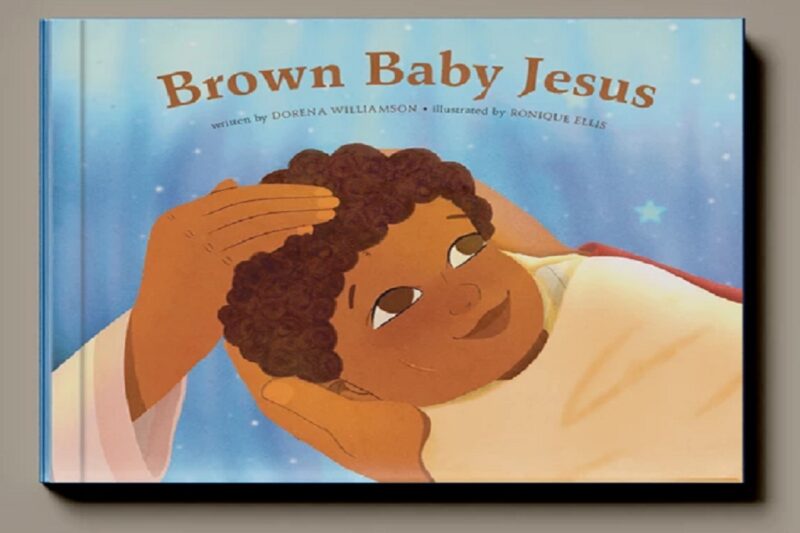 Jesus Was a Brown Baby. By Dorena Williamson / Christianity Today
Jesus Was a Brown Baby. By Dorena Williamson / Christianity Today
This children’s Christmas book paints baby Jesus in a new (or rather ancient) light.
In 2010 I visited the Church of the Annunciation in Nazareth and was struck by how different ethnic groups portrayed baby Jesus. From the shape of his eyes to the shade of his skin, each country portrayed Jesus as one of them.
I have always been fascinated by the women God was pleased to include in Jesus’ family tree. Inspired by memories of Nazareth, I longed to disrupt the cultural norm of a white Jesus with a Biblically accurate depiction that celebrates the diverse world Jesus came to save.
Four years ago, a little brown boy at church asked his white mom why everyone made Jesus so white and suggested I write a book with a brown Jesus. I crafted this story so that children like my young friend could see the multicultural weaving of love that God designed in Jesus’ family tree. Read more
Political / Social
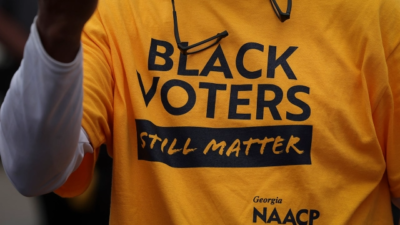 Black voters, long taken for granted, are being prioritized. By Cheyanne M. Daniels / The Hill
Black voters, long taken for granted, are being prioritized. By Cheyanne M. Daniels / The Hill
Democrats are finally prioritizing Black voters, winning notes or approval from advocacy groups who represent one of the party’s most loyal constituencies — one they say has too often been taken for granted.
The ascension of Rep. Hakeem Jeffries (D-N.Y.) to lead House Democrats as a successor to Speaker Nancy Pelosi (D-Calif.) and President Biden’s push to make South Carolina the party’s first primary state illustrate how the party is recognizing the importance of Black voters, advocates say. During the midterms, Black voters were crucial in some of the most closely-watched races – including Georgia, where Black voters made up almost 32 percent of the turnout in the Senate runoff election that secured Democrats the 51-49 majority. Read more
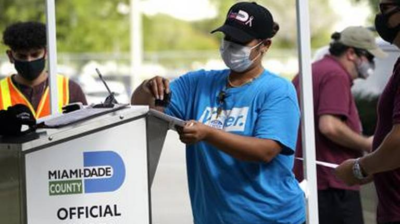 Our right to vote is under assault in Florida — and so is our democracy. By Shvrin Jones / Miami Herald
Our right to vote is under assault in Florida — and so is our democracy. By Shvrin Jones / Miami Herald
This year, voters throughout the country recognized a simple fact as they headed to polls: Democracy was on the ballot.
The freedom to vote in free and fair elections is one of the most fundamental rights we enjoy as citizens of this state and this country. Whether casting a ballot through the mail, during early voting or on Election Day, we can have faith that, in a democracy, this simple act of making our voices heard is how we enact positive change for ourselves, our families and our communities. However, in Florida, our freedom to vote is under attack. At the direction of Gov. DeSantis, who has been taking his cues from the retired Floridian at Mar-a-Lago, the state’s Republican leadership has embarked on a systematic effort to make it harder to cast a ballot, to try to intimidate Black voters and to gerrymander away the Congressional representation that minority communities deserve. Read more
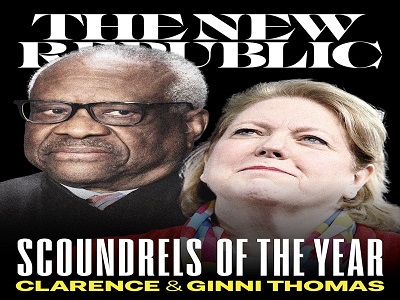 Clarence and Ginni Thomas Are The New Republic’s 2022 Scoundrels of the Year. By Michael Tomasky / The New Republic
Clarence and Ginni Thomas Are The New Republic’s 2022 Scoundrels of the Year. By Michael Tomasky / The New Republic
The Supreme Court justice and his right-wing activist wife are working hand in hand to destroy American democracy.
One day in 1986, in Ronald Reagan’s Washington, a man and a woman met. It was at a conference on affirmative action, which both vehemently opposed. They had made long journeys to get there. She was from comfortably middle-class Omaha, Nebraska, where her ultraconservative parents—her mother was an ally of Phyllis Schlafly, who led the opposition to the Equal Rights Amendment—steeped her in their politics. He came from poor and Black small-town Georgia, where he was instilled with no strong political passions; those came later, as an undergraduate at Holy Cross and after he grew to feel condescended to because he sensed that his Yale Law degree was assumed, in the eyes of those interviewing him for a job, to have been an affirmative action gift. Read more
 Kamala Harris had a most excellent year. By Jonathan Capehart / Wash Post
Kamala Harris had a most excellent year. By Jonathan Capehart / Wash Post
Vice President Harris walked into her ceremonial office at the White House with a broad smile and easy confidence when we sat down for an interview on the Monday before Christmas. And why shouldn’t she smile? President Biden’s electoral right-hand ma’am is finishing a banner year filled with domestic barnstorming and high-wire diplomacy.
Not being tethered to Washington by the pandemic or the threat of razor-thin votes means Harris can travel in the coming months. She can hear directly from the American people, and they can hear directly from her. They can take the measure of her. And they can see what I saw on Monday: a vice president better than her portrayal in the media. Read more
 Jennifer McClellan set to make history in Congress for Virginia. By Zoe Richards / NBC News
Jennifer McClellan set to make history in Congress for Virginia. By Zoe Richards / NBC News
McClellan, a Democrat, won her primary in the special election to represent Virginia’s 4th Congressional District, a heavily Democratic area.
McClellan will face Republican Leon Benjamin, a pastor and Navy veteran who twice lost to McEachin, in the Feb. 21 special election for the 4th District seat. McClellan is widely considered the front-runner in the heavily Democratic area. Read more
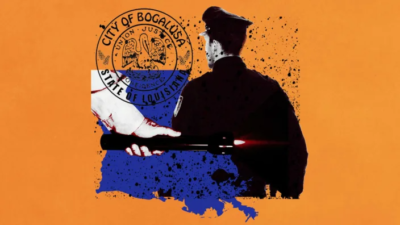 Black Mayor Goes to War With Top Cop in Former ‘Klantown U.S.A.’ By Eileen Grench / Yahoo News
Black Mayor Goes to War With Top Cop in Former ‘Klantown U.S.A.’ By Eileen Grench / Yahoo News
In a city that was the epicenter of both historic and contemporary civil rights battles and once nicknamed “Klantown U.S.A.,” Bogalusans shocked that same old-boy culture in November when they elected a 23-year-old Black Gen Z mayor named Tyrin Truong.
Now, the release of horrific video of events preceding the death of Eric Nelson, a Black man, after his arrest by the Bogalusa Police Department last year has reinvigorated opposition to Chief Bullen—and rekindled debate about Bullen’s own alleged police brutality decades ago. Mayor-elect Truong, who graduated last year from Washington University and was student body president, said that his Facebook post after the election demanding Bullen step down wasn’t a spur-of-the-moment decision. Read more
 Life Expectancy Proves How Far Black Americans Have Come. By Andre M. Perry / Time
Life Expectancy Proves How Far Black Americans Have Come. By Andre M. Perry / Time
In August 2022, the Centers for Disease Control and Prevention reported that over the last two years, Black Americans’ life expectancy declined to about 71 years old, six years lower than their white counterparts.
National disparities in life expectancy can represent the permanency of racism, offering little reason for hope. But in Manassas Park, Va. and Weld County, Colo., the mean-life expectancy for Black residents is 96—a national high among all Black citizens by county. Black people are living in their 80s in larger Democratic jurisdictions like Montgomery County, Maryland and smaller Republican districts like Collier County, Florida. Society is toiling with the same struggles around racism that Du Bois faced at the turn of the 20th century. Nonetheless, we must take the time to recognize empirical signs of progress and not rush toward unsophisticated, untruthful narratives of hopelessness or blind ignorance that remove or dismiss our agency. Read more
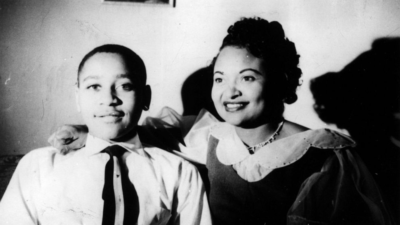 Emmett Till And His Mother Posthumously Awarded Congressional Gold Medal. By Shruti Rajkumar / HuffPost
Emmett Till And His Mother Posthumously Awarded Congressional Gold Medal. By Shruti Rajkumar / HuffPost
The award will be on display near Till’s casket, which resides at the National Museum of African American History and Culture in Washington, D.C
The Emmett Till and Mamie Till-Mobley Congressional Gold Medal Act of 2021, which is now awaiting President Joe Biden’s signature, passed in the House of Representatives on Wednesday. It passed unanimously in the Senate nearly a year ago, on Jan. 10. The Congressional Gold Medal is an award given by Congress to highlight and show national appreciation for distinguished achievements and contributions. Congress has given the medal to fewer than 180 notable historical figures, pioneers and leaders in U.S. history. Recipients have included Rosa Parks, Mother Teresa and the Wright brothers. Read more
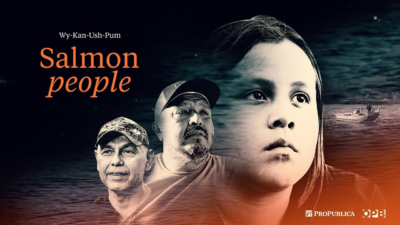 Salmon People: A Native Fishing Family’s Fight to Preserve a Way of Life. By Katie Campbell, and Tony Schick / Propublica
Salmon People: A Native Fishing Family’s Fight to Preserve a Way of Life. By Katie Campbell, and Tony Schick / Propublica
This documentary film features the plight of the salmon of the Columbia River and the Native people whose lives revolve around them.
When the salmon are running up the Columbia River, Native people are there with them. They live, eat and sleep at the river. Their children grow up at the river. They catch salmon for subsistence, for ceremonies and for their living. Watch the documentary, and read all of ProPublica and Oregon Public Broadcasting’s team reporting on the threats facing salmon and the broken treaties that the government swore would protect tribes’ right to fish. Read more
Ethics / Morality / Religion
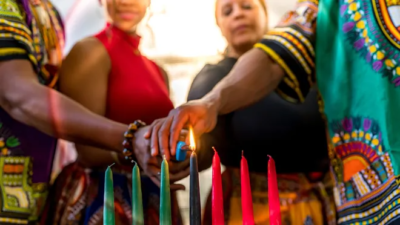 Guide to Kwanzaa 2022: What it is and how to celebrate. By Kaleb A. Brown / USA Today
Guide to Kwanzaa 2022: What it is and how to celebrate. By Kaleb A. Brown / USA Today
While Christmas is fast-approaching, another holiday is coming up right behind it: Kwanzaa. The day to celebrate all things Africa is almost upon us. We’ll give you a crash course on what the holiday is—and how to celebrate.
First celebrated in 1966, Kwanzaa is a celebration of Black culture and African diasporic unity. Each day of Kwanzaa is dedicated to a principle that’s supposed to be reflected on and celebrated. In order, the principles are Umoja (unity), Kujichagulia (self-determination), Ujima (collective work and responsibility), Ujamaa (cooperative economics), Nia (purpose), Kuumba (creativity) and Imani (faith). Kwanzaa begins this year on Monday, December 26th and runs through Sunday, January 1. Read more
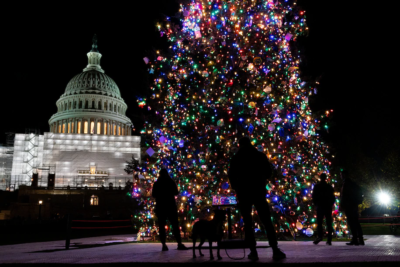 The wise men who helped me understand Christmas. By E.J. Dionne Jr. / Wash Post
The wise men who helped me understand Christmas. By E.J. Dionne Jr. / Wash Post
My reflection on Christmas feels pathetically inadequate when compared with the stunning efforts in these spaces over the years by my colleague Michael Gerson. His final Christmas gift to us was a searingly honest essay as he was struggling with the cancer that would kill him.
“Christmas hope may well fall in the psychological category of wish fulfillment,” he wrote, unflinchingly acknowledging the power of the skeptic’s case upfront. “But that does not disprove the possibility of actually fulfilled wishes. On Christmas, we consider the disorienting, vivid evidence that hope wins. If true, it is a story that can reorient every human story. It means that God is with us, even in suffering.” Read more
 The Americanization of Religion. By Ross Douthat / NYT
The Americanization of Religion. By Ross Douthat / NYT
Ten years ago I published a book called “Bad Religion: How We Became a Nation of Heretics,” which offered an interpretation of the country’s shifting religious landscape, the sharp post-1960s decline of institutional faith. Before the book’s anniversary slips away, I thought I would revisit the argument, to see how it holds up as a guide to our now more de-Christianized society. What the book proposed was that secularization wasn’t a useful label for the American religious transformation. Instead, I wrote, American culture seems “as God-besotted today as ever” — still fascinated with the figure of Jesus of Nazareth, still in search of divine favor and transcendence. Read more
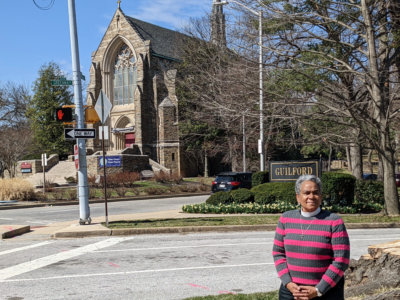 US churches are setting the tone for reparations movement. Kelly Powers and Sammy Gibbons / USA Today
US churches are setting the tone for reparations movement. Kelly Powers and Sammy Gibbons / USA Today
A concept proving viscous in public policy, nearly stagnant at the federal level, is gaining momentum at the altar.
Major faith institutions are addressing reparations in the United States, often ahead of any states where they congregate. The efforts serve as direct attempts at reconciliation for their own involvement in another institution that dawned centuries ago: slavery. New Jersey’s Princeton Theological Seminary vowed over $27 million. Virginia Theological Seminary, $1.7 million. Catholic Georgetown University, $400,000 a year. Episcopal dioceses of New York, Long Island, Texas and Maryland had all launched reparations programs by 2020, while others remain in the works. Texas committed $13 million, Maryland and New York each about $1 million. The list continues. Read more
Historical / Cultural
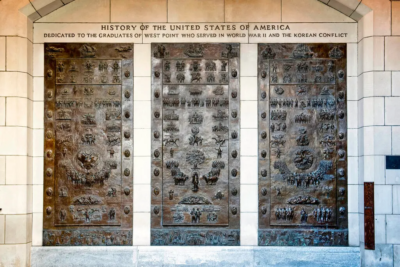 West Point to Remove Confederate Monuments From Its Campus.
West Point to Remove Confederate Monuments From Its Campus.
A Congressional panel identified for removal or modification 13 items at the United States Military Academy that memorialize the Confederacy. Shown are Bronze plaques that depict Gen. Robert E. Lee and other Confederate figures at the U.S. Military Academy at West Point will be placed in storage.Credit…U.S. Military Academy at West Point, via Associated Press
The United States Military Academy at West Point will start removing Confederate symbols from its campus, including taking down a portrait of Gen. Robert E. Lee dressed in his Confederate uniform from the academy’s library, officials said. Over the next year, West Point will also remove, relocate, modify or rename busts, memorials, streets and buildings named after Confederate figures as part of a directive from the Department of Defense. Read more
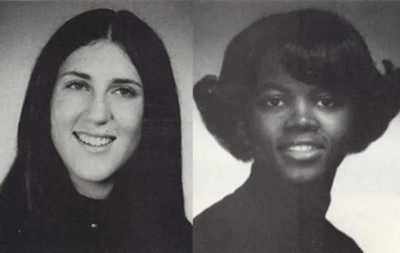 Teaching America’s racist history is first step to addressing inequity. By Jill Lawrence / USA Today
Teaching America’s racist history is first step to addressing inequity. By Jill Lawrence / USA Today
A Black ‘exchange’ student’s experience at my high school shows how systemic racism is a part of all of our histories. So why aren’t we teaching it?
More than 50 years ago in Mississippi, a Black teenager named Pamela Gipson decided to spend her junior and senior years at a blindingly white high school on Long Island in New York. She was 15 years old, and she missed home so much that sometimes, she says, “I would walk down to the street and through the woods to see a major highway, just to see Black people driving.” What on earth led her to leave everything and everyone she knew at that age? The simple answer is that her parents wanted her to have an excellent education and a limitless future. She wanted all that, too. Syosset High was an exceptional school with far more resources than her segregated high school in Jackson. “The whole idea was to broaden my horizons, to better myself, to have a better opportunity,” she says. Read more
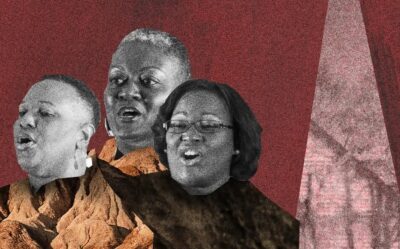 Does the Meaning of a Song Change Depending on Who Wrote It? By Esau McCaulley / NYT
Does the Meaning of a Song Change Depending on Who Wrote It? By Esau McCaulley / NYT
I first heard the Christmas spiritual “Sweet Little Jesus Boy” when I was a small child. It was playing in the background while my grandmother put the finishing touches on the pies, cakes and fixings that would be served for Christmas dinner.
When I decided to write an essay about the spirituals sung every Christmastime in Black churches, I was startled to discover that “Sweet Little Jesus Boy” was written not by an African American during slavery but by a white man named Robert MacGimsey in 1934. Rather than working on a plantation, MacGimsey grew up on one. Read more
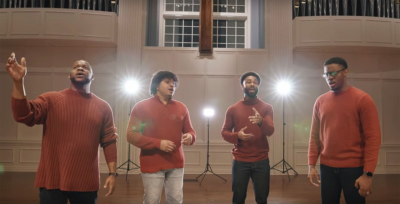 Black Music Sunday: Christmas a capella and more! By Denise Oliver Velez / Daily Kos
Black Music Sunday: Christmas a capella and more! By Denise Oliver Velez / Daily Kos
Kings Return is an a capella vocal group founded in 2016 by J. E. McKissic, Gabe Kunda, Vaughn Faison, and Jamall Williams in Texas. They became known for videos they posted to social media of the group “singing in stairwells,” which provided exquisite acoustics.
The sound of unaccompanied voices with pitch-perfect harmonies weaving Christmas standards together is magical. Whether they are sung by small groups or larger choirs, this music is something that you don’t have to be religious, or even Christian, to appreciate. For those of you who will be gathering together with family and friends, or perhaps just staying quietly at home, I’m pleased to share some of my favorite songs of the holiday season sung a capella, along with one large choral production that was a star-studded moment in music history. Read more
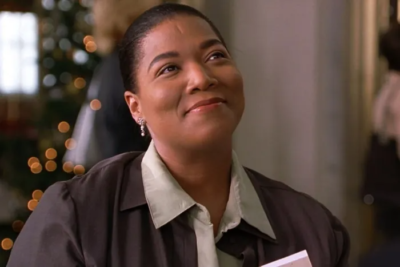 The Best Black Christmas Movies of the Last 20 Years. By Jumoke Balogun and Mitu Yilma / New York Magazine
The Best Black Christmas Movies of the Last 20 Years. By Jumoke Balogun and Mitu Yilma / New York Magazine
Christmas movies can be formulaic, sappy, and cheesy. But a Black-ass Christmas movie — one that is made for Black people and steeped in Black culture, not just a typical white plot dipped in chocolate — meets you at the intersection of generational trauma, singing, out-loud laughter, seasoned meals, and a healthy dose of anxiety. But it’s fun! No, for real. Shown is Queen Latifah, reclaiming her time in Last Holiday (2006). Photo: Paramount+
In the ’90s and early aughts, a few Black-centered holiday movies landed in theaters. But with the introduction of Black-centric channels and streaming services (including BET+, Bounce, TV One, and OWN), we now have a bounty to enjoy every holiday season. Some recognizable themes and tropes run through these stories: Someone’s usually dead, dying, or recently diagnosed. A home or a business is often at stake. Family secrets spill out in the third act. In the spirit of the season, herewith we’ll honor the recurring twists and tropes of a few of the 21st century’s best Black holiday movies. Read more
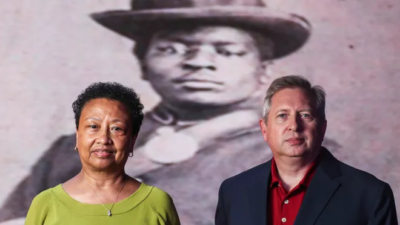 Families reconnect with Black Civil War ancestors with new project. By Genesis Malone / Courier Journal
Families reconnect with Black Civil War ancestors with new project. By Genesis Malone / Courier Journal
For many like Bowlds, finding Civil War ancestors is a search that often runs cold. Record-keeping wasn’t always accurate and often, enslaved persons weren’t recorded under their given names. Many were given or took the last name of their enslaver, leading many searching for their ancestors to a dead end. It’s a dead-end that radio producer and writer Dan Gediman and genealogy researcher and author Denyce Peyton hope to address head-on — and change — with The Kentucky African American Civil War Soldier Project, which seeks to unlock previously hidden information about enslaved people from Kentucky. Read more
![]() The ‘Avatar’ sequel is getting heat from some Indigenous people. By Harmeet Kaur / CNN
The ‘Avatar’ sequel is getting heat from some Indigenous people. By Harmeet Kaur / CNN
“Avatar: The Way of Water” and its director are facing fresh scrutiny from Native audiences, some of whom have criticized the franchise for its “White savior” narrative, use of stereotypes and inadequate representation of Indigenous people.
Yuè Begay, a Navajo artist and activist, called for a boycott of the film in a tweet that’s since received more than 47,000 likes, while Autumn Asher Blackdeer, a scholar from the Southern Cheyenne Nation, compiled a widely shared list of Indigenous-led sci-fi films for viewers to watch instead. Countless others have also weighed in with their own complaints, with some – including Begay – calling out remarks made by Cameron in earlier interviews. The “Avatar” franchise isn’t subtle in its anti-colonial, anti-imperialist and environmentalist themes – Cameron has said as much, previously referring to the first film as “a science fiction retelling of the history of North and South America in the early colonial period.” Read more
 What the Whitney Houston biopic reveals. By Brandon Tensley / CNN
What the Whitney Houston biopic reveals. By Brandon Tensley / CNN
Naomi Ackie plays Whitney Houston in Kasi Lemmons’ new biopic about the late megastar.
“My whole life: ‘She ain’t Black enough. She ain’t White enough.’ Well, how about she’s not obedient enough? How ‘bout she ain’t fearful enough?” That’s Whitney Houston, played by Naomi Ackie, in Kasi Lemmons’ moving and elegant new biopic, “Whitney Houston: I Wanna Dance With Somebody.” She’s responding to criticisms that she’s out of touch with Black audiences – that she’s merely an ingénue whose image and sound have been carefully constructed by White music executives to do just one thing: people-please. Read more
 Disney’s Black mermaid is no breakthrough – just look at the literary subgenre of Black mermaid fiction. By Jessica Pressman / The Conversation
Disney’s Black mermaid is no breakthrough – just look at the literary subgenre of Black mermaid fiction. By Jessica Pressman / The Conversation
“Mermaid stories,” have been told throughout the African continent for millenniums. Mermaids are not just part of the imagination, either, but a part of the living culture.”
Mermaids have become a cultural phenomenon, and clashes about mermaids and race have spilled out into the open. This is most pointedly apparent in the backlash over Disney’s much-anticipated “The Little Mermaid.” After Disney unveiled its trailer for the film, which will be released in May 2023, social media captured the faces of gleeful young Black girls seeing Black mermaids onscreen for the first time. Less inspiring was the racism that simultaneously occurred, with hashtags like #NotMyMermaid and #MakeMermaidsWhiteAgain circulating on Twitter. The fact that Disney’s portrayal of a nonwhite mermaid is controversial is due to 150 years of whitewashing. Read more
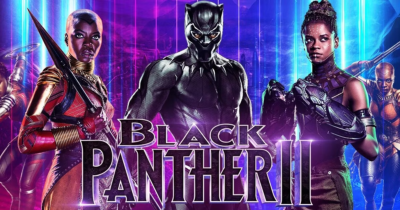 The ‘Black Panther’ Sequel That Never Was. By Reggie Ugwu / NYT
The ‘Black Panther’ Sequel That Never Was. By Reggie Ugwu / NYT
Writer-director Ryan Coogler and co-screenwriter Joe Robert Cole reveal the original plot for “Wakanda Forever” and discuss working in the Marvel universe.
The death of Chadwick Boseman, who played the title role in the original film — a noble but untested leader of the fictional African promised land Wakanda — forced a radical reimagining of the franchise. Coogler and Cole had recently sent Boseman a completed first draft of the script when the actor succumbed to a secret bout with colon cancer. Their eventual rewrite opened with the death of Boseman’s character, T’Challa, turning the $250 million superhero film that followed into what can be fairly described as an extended meditation on grief and recovery. In a recent joint conversation over video, the screenwriters discussed their original vision for a “Black Panther” sequel, how they addressed the loss of Boseman, and balancing the demands of their story with those of the broader Marvel Cinematic Universe. Read more
Sports
 Sloane Stephens Wants to Make Tennis More Equitable and Accessible for All. By Vanity Fair
Sloane Stephens Wants to Make Tennis More Equitable and Accessible for All. By Vanity Fair
The U.S. Open champ looks back on her career, talks about her foundation, and shares how Goldman Sachs Private Wealth Management has helped her grow.
Sloane Stephens has always been wise beyond her years. She went pro at the age of 15, and just five years later, she opened her eponymous foundation while others her age were still declaring their undergraduate majors. Stephens is grateful for the opportunities tennis has presented her, which is why she is so committed to giving back. Read more
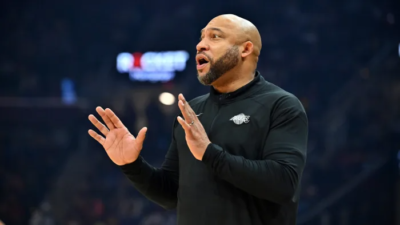 Black men in sports are speaking out about their mental health. By Ken Makin / Andscape
Black men in sports are speaking out about their mental health. By Ken Makin / Andscape
Los Angeles Lakers coach Darvin Ham and former NBA player Michael Beasley reveal their pain. Former Dallas Maverick Tyrell Terry says anxiety led him to retire.
“As Black people, we don’t have enough therapy,” Ham recalled in an excerpt from the interview which later went viral. “I have PTSD [post-traumatic stress disorder] to this day off them shots ringing out, getting shot, the s— going on in my neighborhood. And … we think it’s cowardice or we’re weak if we go get help. And we need so much help, bro.” Read more
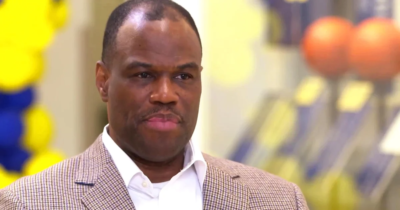 How faith helped NBA legend David Robinson on and off the court. By Corey Robinson / NBC Today
How faith helped NBA legend David Robinson on and off the court. By Corey Robinson / NBC Today
Two-time NBA champion David Robinson’s mark on basketball is undeniable, but the Hall of Famer says it was his faith that played one of the biggest roles in his success on and off the court. The NBA legend sits down with his son, NBC’s own Corey Robinson to share how his relationship with God helped him overcome life’s challenges. Listen here
Site information
Articles appearing in the Digest are archived on our home page. And at the top of this page register your email to receive notification of new editions of Race Inquiry Digest.
Click here for earlier Digests. The site is searchable by name or topic. See “search” at the top of this page.
About Race Inquiry and Race Inquiry Digest. The Digest is published on Mondays and Thursdays.
Use the customized buttons below to share the Digest in an email, or post to your Facebook, Linkedin or Twitter accounts.